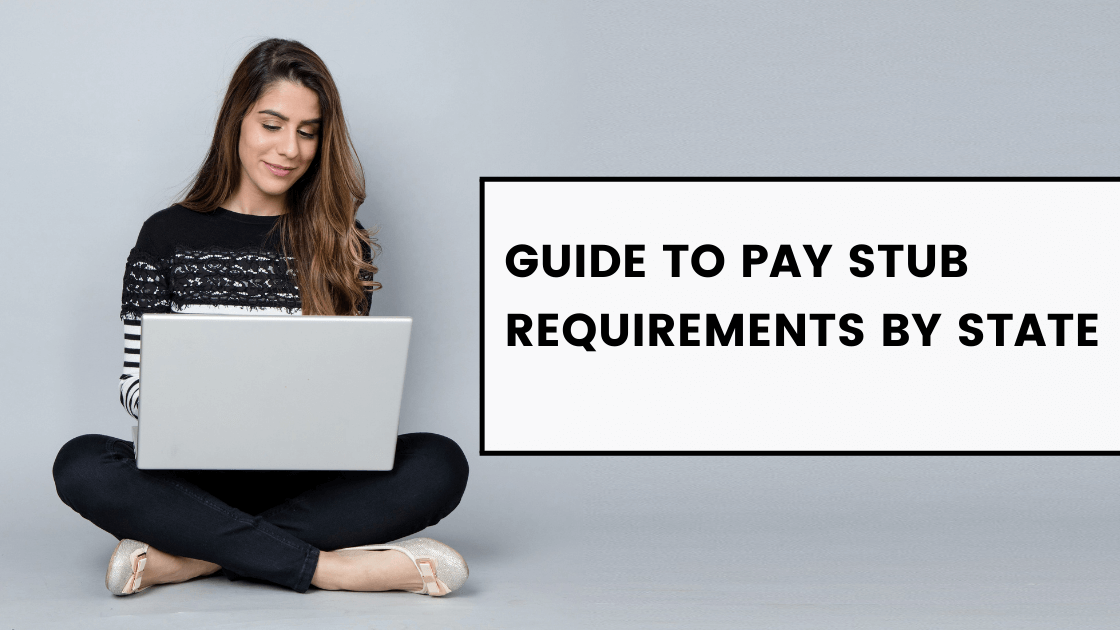
- Stubbuilder
- Apr 22, 2024
The Ultimate Guide To Pay Stub Requirements By State
It is very troublesome to know every state’s pay stub obligations, as the different states have different federal laws. Knowing your pay stub requirements by state will help you and your business comply with the Department of Labor Requirements and will eventually avoid hefty penalties.
This blog will guide you through pay stubs and pay stub requirements by state. Let’s get started.
Understanding Pay Stubs
A pay stub is a document detailing the wages earned by an employee for a certain period. It usually involves information regarding gross wages (the total earned by the employee before deducting any amount), deductibles under taxes, insurance, retirement benefits, and others for the appropriate pay period. Pay Stubs are typically printed at the time of payment and serve as an employee’s record of earnings and deductions.
The first step in generating a pay stub is to have every employee finish their W-4 form. Once you are done with this step, employers are required to provide the below-mentioned details:
- Employee working hours during the pay period
- Total wages are paid before the employee’s deductions are made
- State, Local, and Federal taxes withheld from the employee’s gross earnings
- Other withholdings, which include the employee’s share of insurance premiums
- Net pay
A pay stub is crucial as it can be used as proof of income when employees apply for a loan or need a record to query their gross payment.
Employers must ensure that the information on pay stubs matches the data on every employee’s W-2 form, which is used to file personal income tax returns. As you know, there are various ways employers can generate pay stubs. If your business uses accounting software, it is to be expected that these programs will have built-in pay stub generation systems. Software like Microsoft Excel will be the best choice for business owners to generate their pay stub templates.
Are Employers Required To Provide Pay Stubs?
No federal laws state that employers must provide pay stubs to their employees or that all states should follow. Employers should keep the Fair Labor Standards Act in mind. Federal law establishes minimum wages, overtime pay eligibility, recordkeeping, and child labour standards affecting full-time and part-time workers in the private sector and in the local, state, and federal governments. Though pay stubs are not required under federal laws, the Fair Labor Standards Act depicts that employers should keep employee time and pay records. Therefore, businesses should consult their state’s Department of Labor to determine their sector’s pay stub requirements.
Pay Stub Requirements By State
Every state has different pay stub requirements, meaning employers need to acquaint themselves with these rules.
There are three different types of states:
- Access States
- Access Print/States
- No requirement States
Now let us look at what each of these means and which state falls under which category.
- Access States: These states require employers to provide their employees with access to a pay stub, which includes all their payment information. It is not specified that the pay stub must be a physical copy, which means that the employers can provide it electronically and will still comply with these requirements.
The states include the following:
- Alaska
- Arizona
- Idaho
- Illinois
- Indiana
- Kansas
- Kentucky
- Maryland
- Michigan
- Missouri
- Montana
- Nebraska
- Nevada
- New Hampshire
- New Jersey
- New York
- North Dakota
- Oklahoma
- Pennsylvania
- Rhode Island
- South Carolina
- Utah
- Virginia
- West Virginia
- Wisconsin
- Wyoming
- Access Print/States: States that fall under this category require employers to provide a physical copy of the pay stub, which outlines the employee’s payment information.
Employers can provide electronic paystubs, but they must ensure their employees can print the pay statement.
These states include the following:
- California
- Colorado
- Connecticut
- Iowa
- Maine
- Massachusetts
- New Mexico
- North Carolina
- Texas
- Vermont
- Washington
- No Requirement States: As the name depicts, these states do not require employers to provide pay stubs to their employees.
These states include the following:
- Alabama
- Arkansas
- Florida
- Georgia
- Louisiana
- Mississippi
- Ohio
- South Dakota
- Tennessee
- Opt-out States: Employers should get the employee’s permission before changing how they deliver pay stubs. Within opt-out states, if the employee does not agree to change, the employer must adhere to the original pay stub delivery method.
- Opt-in States: The pay stub has to be physically handed over to the employee. If an employee receives pay stubs electronically, having a physical copy is not necessary. Currently, it only requires employer consent before an electronic pay stub system is implemented in Hawaii—the only state that needs such consent.
Consequences of a Pay Stub Non-Compliance
The penalties for not serving the employees with pay stubs will depend on the state’s laws. According to state law, the penalties vary. Thus, California may fined $50 for an initial violation and $100 per employee for each violation in a pay period. An example of potential damages a California employee can claim is up to $4,000 when the pay stub requirements are violated.
Conclusion
With our pay stub generator free, you can generate paystubs for free. Not only are all deductions and income tax withholdings calculations based on current tax laws, but we also keep up-to-date with new requirements every tax year.










